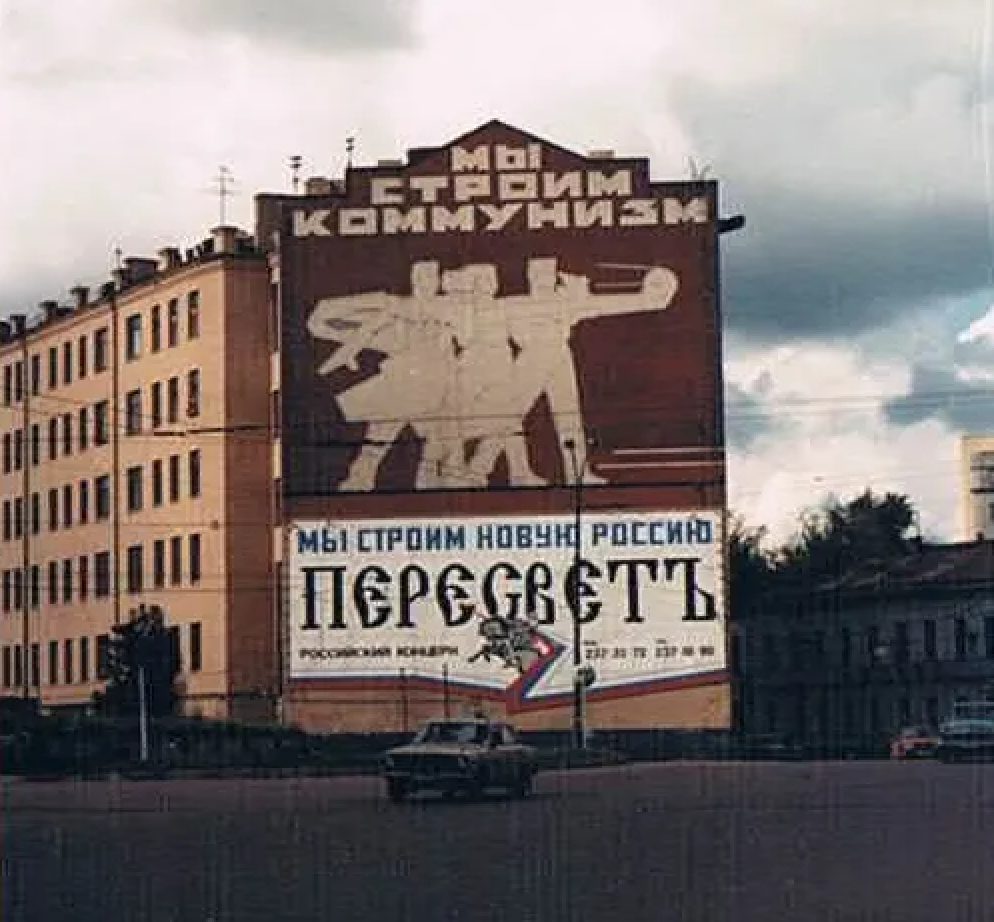Filed Under: Material culture > Political advertising > “We Are Building Communism!" / "We Are Building a New Russia!”
“We Are Building Communism!" / "We Are Building a New Russia!”

Throughout the 1990s, a large proportion of post-Soviet public space, particularly in Moscow, was dominated by nostalgic projects hearkening back to Imperial Russia. For many people, the tsarist past felt like a useful framework for making sense of, and dismissing, the more recent Soviet one. Many Soviet monuments, buildings, and street names were not only removed, but actually replaced with more “authentic” Imperial retro projects. It was during this time, for instance, that the government initiated the rebuilding of the Cathedral of Christ the Savior—originally constructed in 1882, destroyed under Stalin in 1931 in favor of the never-built “Palace of the Soviets,” and transformed into the world’s largest open-air swimming pool in 1958—an expensive undertaking that was only completed by 2000.
The 1993 billboard for the Peresvet Trading Firm on Dobryninskaya Ploshchad’ went in a different direction. Rather than supplanting an existing feature or attempting to restore pre-Soviet symbols, the billboard augments the Soviet message found just above it—"We Are Building Communism!”—with its own wry retort. This slogan works on several levels: for one thing, it highlights the uselessness of ossified Soviet utopianism—since, clearly, the project of “building communism” was never completed and had no future. In contrast, the project of “building a new Russia” sounds like a more attainable possibility, especially if the “new Russia” resembles the old one—hence the Old Church Slavonic stylization of the font and the pre-reform Imperial orthography.
Peresvet’s billboard also looked to the future by aligning itself with contemporary Yeltsinist messaging. In 1993, the President was locked in a power conflict with his own parliament, the Congress of People’s Deputies. Yeltsin’s message in this conflict was that the Congress represented the Soviet past, whereas the presidency represented surging ahead toward a post-Soviet future. Indeed, “We are building a new Russia” was the Yeltsin team’s slogan during the 25 April 1993 referendum, which he won against the Congress, albeit not decisively. Peresvet simply appropriated Yeltsin’s slogan for itself, thus making its own business dealings— and, by extension, post-Soviet capitalism—seem historically legitimate. Given the fraudulent nature of many post-Soviet enterprises, Perersvet’s associations with a then-successful Yeltsin, combined with the borrowed grandeur of the imperial past, may have seemed especially important for allaying the suspicions of potential customers. Although the word “Peresvet” was subsequently used by several successful businesses and banks, this particular outfit existed for about a year and had no relation to its future namesakes. In the end, its contribution to the “building of a new Russia” amounted to bartering cars for leather jackets in China.
The 1993 billboard for the Peresvet Trading Firm on Dobryninskaya Ploshchad’ went in a different direction. Rather than supplanting an existing feature or attempting to restore pre-Soviet symbols, the billboard augments the Soviet message found just above it—"We Are Building Communism!”—with its own wry retort. This slogan works on several levels: for one thing, it highlights the uselessness of ossified Soviet utopianism—since, clearly, the project of “building communism” was never completed and had no future. In contrast, the project of “building a new Russia” sounds like a more attainable possibility, especially if the “new Russia” resembles the old one—hence the Old Church Slavonic stylization of the font and the pre-reform Imperial orthography.
Peresvet’s billboard also looked to the future by aligning itself with contemporary Yeltsinist messaging. In 1993, the President was locked in a power conflict with his own parliament, the Congress of People’s Deputies. Yeltsin’s message in this conflict was that the Congress represented the Soviet past, whereas the presidency represented surging ahead toward a post-Soviet future. Indeed, “We are building a new Russia” was the Yeltsin team’s slogan during the 25 April 1993 referendum, which he won against the Congress, albeit not decisively. Peresvet simply appropriated Yeltsin’s slogan for itself, thus making its own business dealings— and, by extension, post-Soviet capitalism—seem historically legitimate. Given the fraudulent nature of many post-Soviet enterprises, Perersvet’s associations with a then-successful Yeltsin, combined with the borrowed grandeur of the imperial past, may have seemed especially important for allaying the suspicions of potential customers. Although the word “Peresvet” was subsequently used by several successful businesses and banks, this particular outfit existed for about a year and had no relation to its future namesakes. In the end, its contribution to the “building of a new Russia” amounted to bartering cars for leather jackets in China.